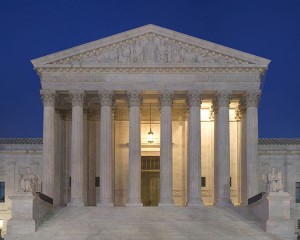The Supreme Court Announces its Decision in Bullcoming v. New Mexico in Favor of the Petitioner
The Supreme Court of the United States has reversed the decision in the case of Bullcoming v. New Mexico siding with the argument that the prosecution using a surrogate forensic analyst who was not involved in the actual testing is in violation of The Confrontation Clause.

As a foremost authority in gas chromatography, PA DUI Attorney Justin McShane was one of the lawyer-scientists who co-authored the amicus brief in this case and The Court favored amici arguments in its opinion. The credit goes to Professor Jeffrey Fisher who framed, wrote and argued successfully not only this case but all of the other Confrontation Clause wins. The influence of the amicus brief that McShane co-authored with Lenny Stamm, Ron Moore, Barbara Bergman, Molly Schmidt-Nowara and Alexandra Freedman Smith could clearly be seen throughout and in particular here:
Gas chromatography is a widely used scientific method of quantitatively analyzing the constituents of a mixture. See generally H.McNair & J. Miller, Basic Gas Chromatography (2d ed. 2009) (hereinafter McNair). Under SLD’s standard testing protocol, the analyst extracts two blood samples and inserts them into vials containing an “internal standard”—a chemical additive. App. 53. See McNair 141–142. The analyst then “cap[s] the [two] sample[s],” “crimp[s] them with an aluminum top,” and places the vials into the gas chromatograph machine. App. 53–54. Within a few hours, this device produces a printed graph—a chromatogram—along with calculations representing a software-generated interpretation of the data. See Brief for State of New Mexico Dept. of Health, SLD as Amicus Curiae 16–17.
Although the State presented testimony that obtaining an accurate BAC measurement merely entails “look[ing] at the [gas chromatograph]machine and record[ing] the results,” App. 54, authoritative sources reveal that the matter is not so simple or certain. “In order to perform quantitative analyses satisfactorily and . . . support the results under rigorous examination in court, the analyst must be aware of, and adhere to, good analytical practices and understand what is being done and why.” Stafford, Chromatography, in Principles of Forensic Toxicology 92, 114 (B. Levine 2d ed. 2006). See also McNair 137 (“Errors thatoccur in any step can invalidate the best chromatographic analysis, so attention must be paid to all steps.”); D. Bartell, M. McMurray, & A. ImObersteg, Attacking and Defending Drunk Driving Tests §16:80 (2d revision 2010) (stating that 93% of errors in laboratory tests for BAC levels are human errors that occur either before or after machines analyze samples). Even after the machine has produced its printed result, a review of the chromatogram may indicate that the test was not valid. See McNair 207–214.Nor is the risk of human error so remote as to be negligible. Amici inform us, for example, that in neighboring Colorado, a single forensic laboratory produced at least 206 flawed blood-alcohol readings over a three-year span, prompting the dismissal of several criminal prosecutions. See Brief for National Association of Criminal Defense Lawyers et al. as Amici Curiae 32–33. An analyst had used improper amounts of the internal standard, causing the chromatograph machine systematically to inflate BAC measurements. The analyst’s error, a supervisor said, was “fairly complex.” Ensslin, Final Tally on Flawed DUI: 206 Errors, 9 Tossed or Reduced, Colorado Springs Gazette, Apr. 19,2010, p. 1 (internal quotation marks omitted), available at https://web.archive.org/web/20100423130259/http://www.gazette.com:80/articles/report-97354-police-discuss.html . (All Internet materials as visited June 21, 2011, and included in Clerk of Court’s case file).
This is yet another milestone in Attorney McShane’s illustrious career as a DUI attorney and speaks volumes about his experience and knowledge. While most lawyers in Pennsylvania have never taken a DUI case to trial, Attorney McShane has helped fight and win DUI cases and provided input in The Supreme Court of the United States that has now had a global impact on all DUI prosecutions throughout the United States.
If you are looking for an experienced Pennsylvania DUI Attorney to handle your case, choose the best- choose The McShane Firm at 1-866-MCSHANE.